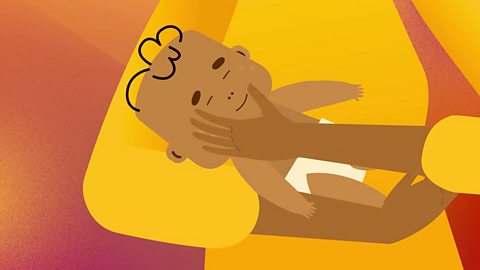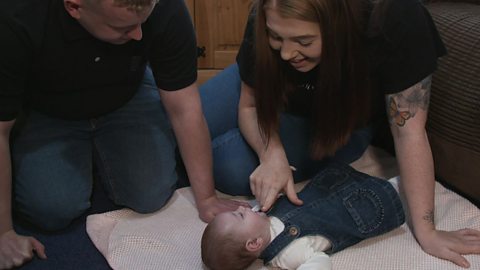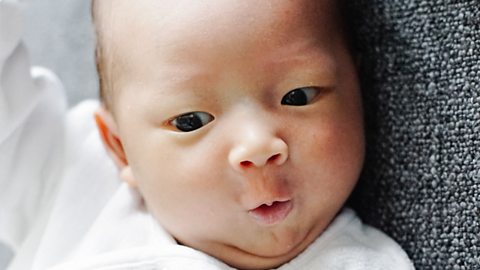Baby massage is a blissful way for you and your baby to bond.
And although it has countless benefits, the core principles are quite simple.
ãBasically, baby massage means a caregiver using very soothing, loving and rhythmic strokes on each area of a babyãs body in turn,ã explains Louise Wilkinson of Precious Beginnings, a certified instructor with the International Association of Infant Massage.
ãAnd it may be called baby massage but the techniques can be used in older childhood and beyond. It can continue as long as your child wants,ã explains Louise.
Benefits of baby massage
ãItãs super-relaxing for them and can improve the quality of their sleep. Touch releases oxytocin ã the love hormone ã in you too, so youãll feel calmer as well,ã says Louise. ãIt can help with babyãs flexibility, body awareness and coordination ã for example, realising that their foot is part of their body. Thereãs also evidence to show it can help with specific conditions like wind, colic and teething discomfort.ã
But the benefits donãt end there. Baby massage builds your shared bond, explains Louise.

ãMassage helps you and your baby learn how to communicate with each other. It helps your baby feel secure, loved and respected by you and youãll learn about their subtle cues, understand their behaviour and be responsive to them too. This helps you feel more confident as a parent and there are studies to show it can reduce postnatal depression.
ãThe interactions you have during massage are also the building blocks of language development because you have eye-to-eye contact and an opportunity for copying and turn-taking, which helps your child learn conversation skills.ã
How to do it
ãYou can actually start before your baby is born by massaging your bump, talking and singing to them,ã says Louise. ãOnce theyãre in the world, Iãd recommend trying baby massage before theyãre crawling, as it can get trickier when theyãre able to move around. But itãs never too late to start,ã says Louise.
Itãs natural to feel nervous about using massage, particularly in terms of how much pressure is safe for your baby. Classes and workshops with qualified instructors can help you build your confidence and can connect you with other parents ã ask your midwife or health visitor for recommendations or search online.
But if you arenãt able to get to classes, there are lots of simple touch techniques you can try safely at home. These include stroking up and down your babyãs legs while youãre supporting their ankles, soft circular clockwise motions around their tummy, circles on their palms and very gentle tugs of their fingers and thumbs, as you hold their wrists.
The charity has some tips on how to massage different parts of your baby.
Create a calm and comfy environment
ãIdeally, try sitting on the floor to massage your baby, placing them on a changing mat or soft towel. If thatãs not possible, for example, because you have a disability, place them safely on a bed, sofa or table,ã explains Louise.
Take off any jewellery that could catch your babyãs skin, be careful of long nails, scarves and necklaces dangling from your neck.
"Make sure your room is warm and Iãd recommend keeping the lighting very natural and low, rather than placing a light directly over your baby.ã
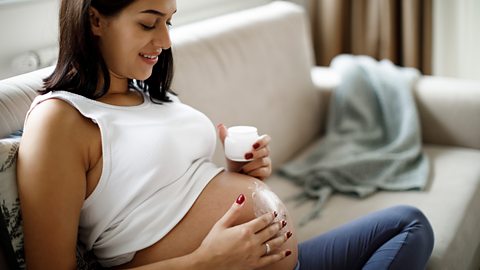
Use a baby-safe oil or lotion
recommends avoiding oils in your babyãs first month, as their skin is pretty delicate.
Once theyãre old enough, get a baby-specific product from your pharmacy, health shop or supermarket, which contain a blend of oils.
ãOr choose a pure, non-scented natural vegetable or fruit oil such as grapeseed. Olive oil is not recommended,ã says Louise. ãYou donãt need much in the palm of your hand and remember oils make your and your babyãs skin slippy, so take care picking them up. If you use an emollient cream because your baby has dry skin or eczema, then you could use that instead. You could also try touches and strokes through their clothes too without using an oil.ã
Follow your baby's lead
Although itãs great as part of your babyãs bath and bedtime routine, there are no hard and fast rules about the best time for massage. Instead, use your babyãs cues as a guide ã they should be quietly alert and content. If they are tired and hungry, itãs best waiting.
Before you start ãask their permissionã explains Louise. ãFor example, if you say ãWould you like a massage?ã and use a visual signal, such as holding out a hand, so your baby can see that youãre about to start, and they smile or pull your hand towards them, then they're ready.ã If they are restless and turn their head, theyãre not ready.
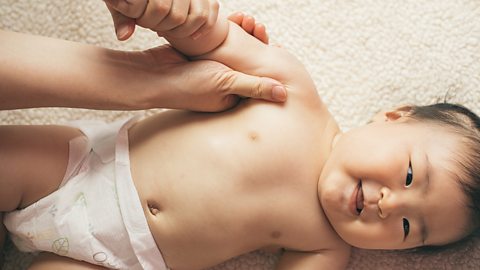
Adapt your approach according to your baby too. ãFor example, premature babies can be quite sensitive and need a much gentler approach ã this might simply be holding your hands just above them and so they feel the warmth,ã says Louise. How long the massage lasts also depends on baby.
ãIt might be that you're only getting a leg done before they fall asleep or become restless and thatãs OK. Donãt worry about massaging their whole body if theyãre not up to it. The younger they are, the shorter and less frequent their alert times are likely to be.ã
Chatting, singing and telling stories can help
Talk and name body parts as you go ã itãs a great way for your baby to start to learn about themselves. Singing during your massage times can also be really reassuring for baby and will help boost their language development.
Nursery rhymes are particularly good as they have actions that can accompany your touches and strokes, adds Louise. ãIãd recommend Round and Round the Garden, Pat-A-Cake, Incy Wincy Spider, Tommy Thumb or Jelly on a Plate.ã
Safety notes
- Remember not to leave your baby unattended at any time.
- Patch test oil or lotion on your baby before you use it for the first time: dab on a small area of their skin to make sure they donãt have a reaction.
- Avoid putting pressure on your babyãs joints during massage.

